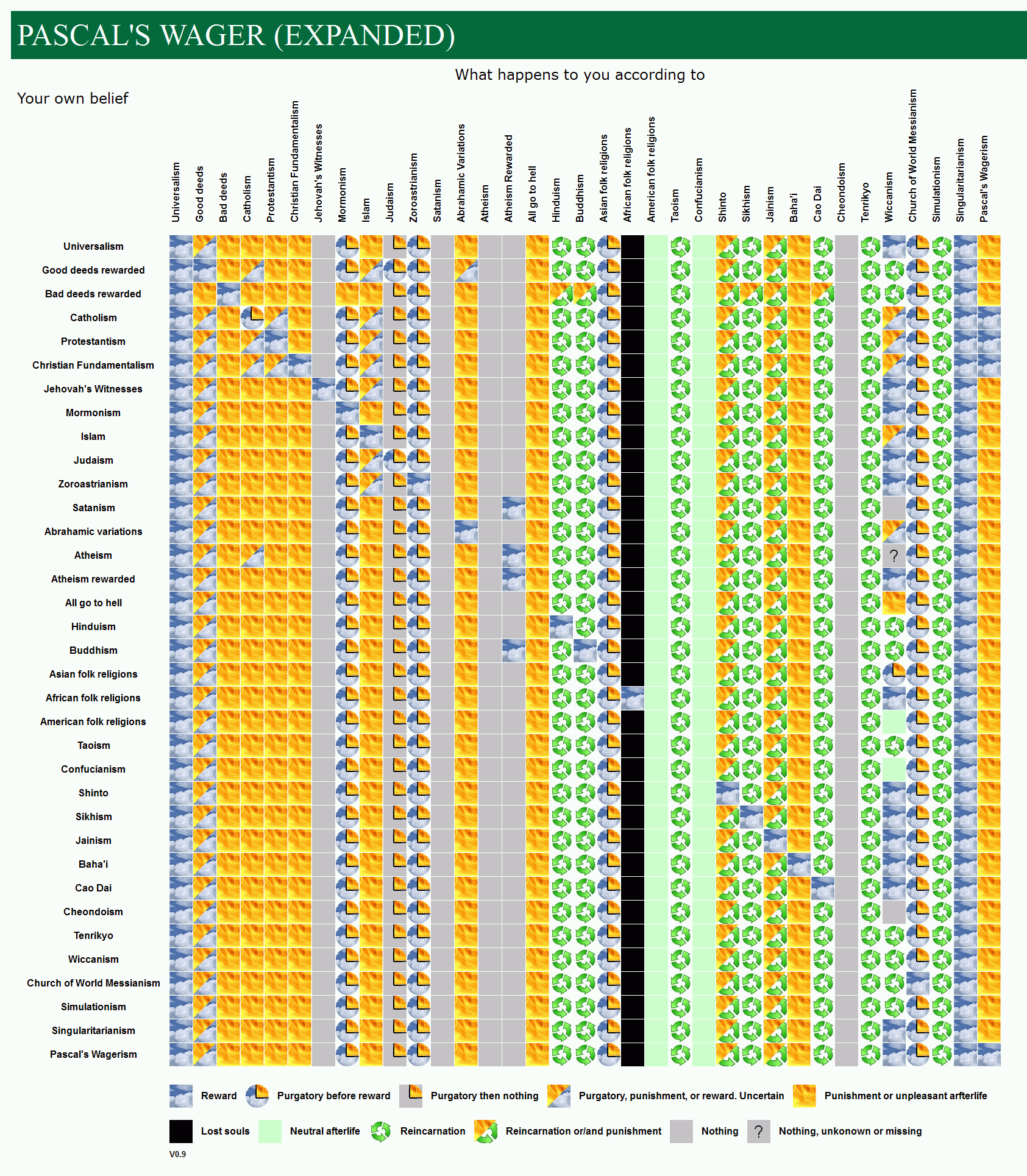Welcome to DU!
The truly grassroots left-of-center political community where regular people, not algorithms, drive the discussions and set the standards.
Join the community:
Create a free account
Support DU (and get rid of ads!):
Become a Star Member
Latest Breaking News
Editorials & Other Articles
General Discussion
The DU Lounge
All Forums
Issue Forums
Culture Forums
Alliance Forums
Region Forums
Support Forums
Help & Search
Religion
Related: About this forumPascal's Wager
https://en.wikipedia.org/wiki/Pascal%27s_WagerThe Wager uses the following logic (excerpts from Pensées, part III, §233):
God is, or God is not. Reason cannot decide between the two alternatives.
A Game is being played... where heads or tails will turn up.
You must wager (it is not optional).
Let us weigh the gain and the loss in wagering that God is. Let us estimate these two chances. If you gain, you gain all; if you lose, you lose nothing.
Wager, then, without hesitation that He is. (...) There is here an infinity of an infinitely happy life to gain, a chance of gain against a finite number of chances of loss, and what you stake is finite. And so our proposition is of infinite force, when there is the finite to stake in a game where there are equal risks of gain and of loss, and the infinite to gain.
But some cannot believe. They should then 'at least learn your inability to believe...' and 'Endeavour then to convince' themselves.
God is, or God is not. Reason cannot decide between the two alternatives.
A Game is being played... where heads or tails will turn up.
You must wager (it is not optional).
Let us weigh the gain and the loss in wagering that God is. Let us estimate these two chances. If you gain, you gain all; if you lose, you lose nothing.
Wager, then, without hesitation that He is. (...) There is here an infinity of an infinitely happy life to gain, a chance of gain against a finite number of chances of loss, and what you stake is finite. And so our proposition is of infinite force, when there is the finite to stake in a game where there are equal risks of gain and of loss, and the infinite to gain.
But some cannot believe. They should then 'at least learn your inability to believe...' and 'Endeavour then to convince' themselves.
Let's see how Pascal's Wager changes when we add the information that there is not one religion but multiple religions.
God is, or God is not. Reason cannot decide between the two alternatives. (From a mathematical/philosophical point of view, this is correct. As we cannot define God, we cannot reason whether he exists or not.)
A Game is being played... where heads or tails will turn up.
You must wager (it is not optional).
Let us weigh the gain and the loss in wagering that you choose to worship the correct God. Let us estimate these two chances. If you choose correctly, you receive whatever reward religion bestows upon a faithful believer. If you choose incorrectly, you receive whatever punishment religion bestows upon the heathen and heretic.
Wager, then, without hesitation to not worship Him at all. There is an infinity of possible Gods to worship but the number of Gods you worship is finite. And so our proposition is of infinite force, when there is infinitely many ways to err and be punished and finite ways to choose correctly and be rewarded.
But some prefer to believe. They should then 'at least learn your ability to reason...' and 'Endeavour then to convince' themselves.
InfoView thread info, including edit history
TrashPut this thread in your Trash Can (My DU » Trash Can)
BookmarkAdd this thread to your Bookmarks (My DU » Bookmarks)
7 replies, 1370 views
ShareGet links to this post and/or share on social media
AlertAlert this post for a rule violation
PowersThere are no powers you can use on this post
EditCannot edit other people's posts
ReplyReply to this post
EditCannot edit other people's posts
Rec (0)
ReplyReply to this post
7 replies
 = new reply since forum marked as read
Highlight:
NoneDon't highlight anything
5 newestHighlight 5 most recent replies
= new reply since forum marked as read
Highlight:
NoneDon't highlight anything
5 newestHighlight 5 most recent replies
Pascal's Wager (Original Post)
DetlefK
Jan 2019
OP
NeoGreen
(4,033 posts)1. There is no spoon. (NT)
Major Nikon
(36,900 posts)2. It's always been childish reasoning at best
Regardless of what you stand to win or lose, the premise becomes no more true or false. It's really no different than the wager religionists have been making for several millennia. The condition for the promised unverifiable reward relies primarily on the belief that the reward exists. A fool's bet if there ever was one.
unblock
(54,157 posts)3. This argument also works to sell most any complete fraud
The mere pittance of money you part with is nothing compared to the myriad benefits of this balm, the salve, this potion!
An argument based solely on the purported payoffs is a sucker's argument.
trotsky
(49,533 posts)4. Any Christian who tries to use Pascal's Wager needs to ask themselves...
would Pascal's Wager work on you for a different god?
SeattleVet
(5,590 posts)5. Expanded to include a lot of other religions:

brooklynite
(96,882 posts)6. Did Pascal offer odds?
Act_of_Reparation
(9,116 posts)7. Of all the various forms of apologia...
...Pascal's Wager is the most dishonest.